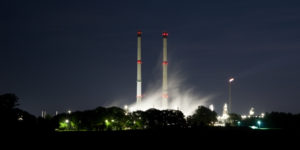by Andy Gheorghiu and Frida Kieninger

Photo by: Christian Eckhardt
On 2 December, a number of German citizens’ initiatives[1] met with Food & Water Europe in Hamburg to discuss oil and gas exploration in the country and strategies for the coming year.
The main points discussed were planned exploration in a water protection area in Verden, Lower Saxony, an international project by Hansa Hydrocarbons to drill for gas in the North Sea (nearby the Wadden Sea), and the construction of a terminal to import liquefied natural gas (LNG) in Brunsbüttel port.
New drilling in a water protection area?
Despite concerns over the dangerous practice, a water protection area in Lower Saxony could become the subject of drilling for hydrocarbons. The German company DEA wants to extract gas in this highly sensitive zone, going against the legal principle of “duty of care” and threatening to impact water quality as well as the environment, nature and landscape of the area. Conventional drilling would constitute a considerable threat, but fracking poses an even higher risk to this sensitive area. The German citizen initiatives and Food & Water Europe call upon officials to dismiss this application for drilling in the water protection area.
Gas extraction plans near the Wadden Sea and Borkum
Hansa Hydrocarbons, a London-based company, plans gas exploration close to the island of Borkum. Some stakeholders and nature conservation groups have been involved in the planning approval process, but the broader public and those affected were not informed despite the proximity of the project to highly sensitive maritime protection areas. An accident on the drilling rig would have disastrous impacts on the subsea ecosystem, protected birds in the area and regional tourism.
The GEOMAR Helmholtz-Zentrum for Ocean Research showed in a recent study that oil and gas wells are leaking considerable amounts of methane in the North Sea and that they constitute a source of powerful greenhouse gases that should not be underestimated. The German citizen initiatives and Food & Water Europe call upon the German central government and the government of Lower Saxony to reject the proposed oil and gas project near the Wadden Sea and Borkum.
A citizen’s initiative to protect water in Schleswig-Holstein
The so-called German “fracking ban” adopted in 2016 only prohibits fracking in certain rock formations (shale and coal bed methane), which do not exist in the state of Schleswig-Holstein. A complete ban of oil and gas extraction would be necessary to bring policy in line with the Paris Agreement but this important aspect has not even been discussed. Now, a citizen’s initiative is calling for a legal clarification to protect drinking water as well as maritime and coastal protection in the German federal state of Schleswig-Holstein. If you happen to be a citizen of Schleswig-Holstein, you can find information around the initiative here.
Protecting the climate and building a new LNG terminal? Incompatible!
While the issue of methane – the main component of “natural” gas – and its high global warming potential are increasingly the focus even of some fossil fuel corporations, plans to invest in liquefied natural gas imports are clearly counterproductive. Nevertheless, the state of Schleswig-Holstein supports plans for an LNG terminal in the port of Brunsbüttel. This would be Germany’s first LNG terminal, and will most certainly be equally underused as all the other European terminals – at around a fifth of their capacities. Moreover, it is likely that a major share of the LNG in Brunsbüttel will be used for the production of fertilizers and petrochemical products. If Germany wants to honour the Paris Agreement, it not only has to move swiftly away from coal, but must also get serious about the phase out of all fossil fuels.
[1] Bürgerinitiative FrackingFreies Hamburg (Hamburg), Bürgerinitiative gegen CO2-Endlager e.V. (Schleswig-Holstein), Bürgerinitiative gegen Gasbohren im Landkreis Rotenburg e. V. (Niedersachsen), Bürgerinitiative Kein Fracking in der Heide (Niedersachsen), Bürgerinitiative Saubere Umwelt und Energie Altmark (Sachsen-Anhalt), Bürgerinitiative Umweltschutz Lüchow-Dannenberg (Niedersachsen), Bürgerinitiative Gesundheit Hemslingen-Söhlingen (Niedersachsen), Bürgerinitiative Walle gegen GasBohren (Niedersachsen), Bürgerinitiative Wittorfer Bürger für Umwelt und Gesundheit (Niedersachsen), Interessengemeinschaft Wiedau (Niedersachsen)


